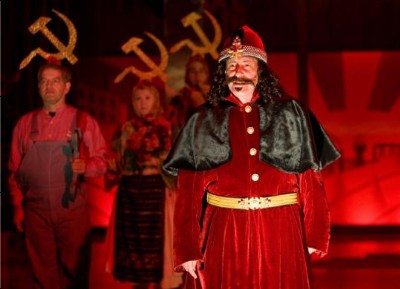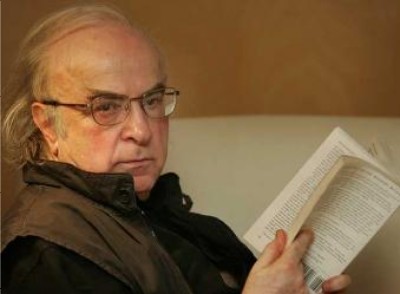World Theater: Sucked Dry, or Let Romania Speak for Itself
By Bill Marx
Earlier this month, Horace Engdahl, permanent secretary of the Swedish Academy, stoked up the cultural consternation machine when he implied that American writers are too provincial to win the Nobel Prize for Literature. American literary life is “too isolated, too insular” he opines, its writers don’t translate particularly well and they aren’t players in the “big dialogue of literature.”

American Repertory Theatre performer Will LeBow: Is he Vlad the Impaler or a refugee from “The Munsters”?
The scattershot charge triggered a predictable series of silly reposes, ranging from American critics and editors chest-thumping for the home team and critical cries that literature is too transcendental to be part of a transcultural dialogue to my favorite, a “New York Times” think piece suggesting that Engdahl may have revenge on his mind, payback for America’s success at selling its pop culture around the globe.
Given this country’s current economic down turn, a lull in the junk export business may be on the way. Maybe Enghahl senses it is time for other cultures to stake their claim.
The argument for American’s literary insularity is slam-dunk: an abysmally small number of books are translated into English each year and there is little coverage of what manages to appear, aside from the work of a superstar or two. But the problem is not just our entrenched apathy about listening to international voices. Even when American artists reach out to other cultures they often end up twisting them into cockeyed versions of our own — our mugs are distorted in a funhouse mirror for the sake of global understanding.
Mediocre case in point: the world premiere production of “The Communist Dracula Pageant” at the American Repertory Theatre in Cambridge, MA. The marketing friendly don’t-worry-it-is-all-about-us-not-them sub-title for the show (which runs through November 9) tells all: “By Americans, for Americans a play about the Romanian Revolution of 1989 with hallucinations, phosphorescence, and bears.” In other words, self-serving “experimental” vaudeville catering to a country that figures that “history is bunk.”
Dramatist Anne Washburn’s wan mess of a black comedy, first workshopped in 2001, connects the murderous reigns of Romanian dictator Nicolae Ceausescu and Vlad the Impaler (the model for Dracula). The link encourages facile comparisons of the leaders presented via monster movie cliches, including flashbacks to a frothing Vlad ranting about scorched-earth atrocities. Washburn hops about in time, from Vlad to Nicolae, combining transcriptions of real events, such as rebels taking over a television station and snatches of the Ceausescu trial, with bits of blowzy sketch comedy. Set in an Eastern Europe with all the cartoon specificity of Freedonia in “Duck Soup,” the play careens from Saturday Night Live japes to melodramatic playlets about the downtrodden. No insights into the banality of Ceausescu’s evil on display — aside from piling on the banality.

The Real Thing: Romanian writer Mircea Cărtărescu
Dramaturgical clumsiness aside, the comparison between Nicolae and Vlad isn’t particularly apt or illuminating. In his excellent history “Postwar,” Tony Judt writes that “compared with Dej’s vicious dictatorship of the Fifties, Ceausescu’s regime got by with relatively little overt brutality.” He intimidated the populace via “Byzantine levels of nepotism and inefficiency” propped in place by “a tentacular secret police.” Also, perhaps because the play is “by Americans, for Americans,” it leaves out a major reason Ceausescu managed to maintain power for as long as he did: the lack of foreign criticism. As Judt puts it “because the Romanian leader was happy to criticize the Russians (and send his gymnasts to the Los Angeles Olympics), Americans and others kept quiet about his domestic crimes.”
Ironically, the ART’s decision to produce this play now reflects the stubborn chutzpah of American provincialism. Since the script was written there has been an explosion of Romanian creativity, especially in cinema and letters. Are there no first rate plays by contemporary Romanian playwrights? No scripts that have more to say about the end of dictatorship than “The Communist Dracula Pageant”? Shouldn’t the ART be about discovering those voices? (Hey, Chekhov was Russian once.)
Those who want to learn something about Romanian society before and after 1989 will find more revelations in a page of Norman Manea (“The Black Envelope,” “On Clowns: The Dictator and the Artist”) and Mircea Cărtărescu (“Nostalgia”), more insights in a frame of the films “The Death of Mr. Lazarescu” and “California Dreamin’” than in all of Washburn’s play. The later recycles an old and discouraging lesson about American navel-gazing – we are afraid to let other countries speak for themselves.
Tagged: American-Repertory-Theatre, Anne-Washburn, Books, Featured, Norman-Manea, Persona Non Grata, Theater, the-communist-dracula-pageant

